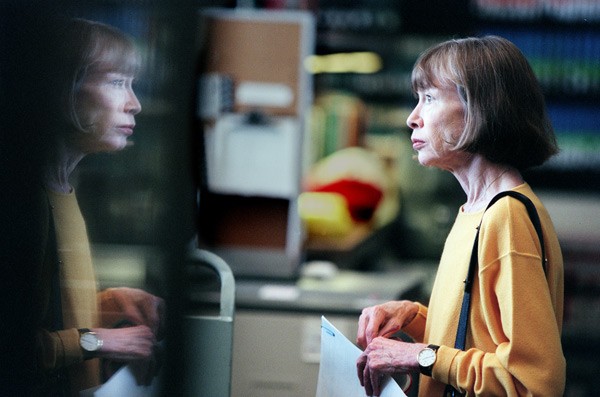Dwelling on Blue Nights: Joan Didion in Toronto

"It's like seeing Bob Dylan," my friend said as we waited in line to see Joan Didion at Toronto's Harbourfront Centre last week. Didion, who gave us Slouching Towards Bethlehem, "Why I Write" and Play It as It Lays; the California-born writer with that direct, precise voice and those simple, punchy sentences. The chit-chat from the writers, professors and bibliophiles who had filled the Brigantine Room suddenly stopped as the curtain was pulled back. You would only have been able to see Didion if you were sitting near the front; how the back row sensed her presence instantly is still a mystery. But there she sat in the front row, not yet onstage, everyone staring at her.
Didion, who now lives in New York, was in town to promote her latest book, Blue Nights. She was interviewed by the author Margaret MacMillan, whose input failed to draw out anything new: taking her cue from the deaths of Didion's husband and daughter and their roles in her most recent books, MacMillan focused the conversation around grief and how we are all unable to discuss it. Didion dodged questions, preempting her non-answers with a nervous laugh.
Joan Didion has such a strong command of language that even her reluctance to be interviewed was revealing. A dedicated reader can easily pinpoint the differences between her fiction and non-: when writing fiction, she often uses a steady rhythm and simple sentences, while she packs every phrase of her non-fiction with details and thoughts. But after writing The Year of Magical Thinking, about losing her husband, Didion said she realized that she couldn't control everything. Blue Nights is a meditation on this idea.
During the talk, MacMillan commented on how the two books "fit so well together."
"They fit together because we know they're the same family," said Didion, correcting her. "Magical Thinking seemed to me a very different book...for one thing, it had a strong narrative—it begins and ends. It's a narrative that pushes you along. Blue Nights had no narrative. It was more of a moral reflection."
Didion writes in Magical Thinking that she has realized "life changes fast. Life changes in the instant." After her husband, John Gregory Dunne, died suddenly at the dinner table, she said her instinct was to be the "pretty cool customer"—in charge and in control, despite her grief. But after months of this, a flood of memories left her trying to put everything back together and make sense of it all. "If you're a writer, you think you can make the world your way," Didion explained.
She said it was that impulse to make sense of the world that propelled Blue Nights. "Memory fades, memory adjusts, memory conforms to what we think we remember," writes Didion. This is the impulse of a writer, who begins with a literary idea of experience; who has an idea of how things work, but never really comprehends until it happens to her. As we look back on difficult events, our instinct might be to reconstruct everything, and reorder events in an effort to mine meaning from them. This is usually futile—an "incorrect thought," as Didion put it—but we can't help it. "Like when someone dies, don't dwell on it," Didion's daughter, Quintana Roo, once advised her. Quintana's own death, shortly before Magical Thinking was released, was the impetus for Didion's next book. "We never really talked about why she so strongly resented dwelling on it," the writer said last week. "It's a conversation I would love to have with her."
Didion explained that, while writing Blue Nights, she had tried to distance herself from writing about her own parenting experiences; the book was supposed to be "heavily researched" but "it just willy-nilly became personal." She planned to anchor herself on quotations in an effort to distance herself from the words she finds "inadequate."
Throughout the book, Didion repeats key phrases; they echo each other or build momentum as the meaning or significance of the memories change. At one point, MacMillan asked whether Didion was losing her memories. "Because I write them down?" Didion interrupted, revealingly. "No, because time goes by," MacMillan said.
In Blue Nights, it never really seems as if Didion is talking about Quintana. Instead, Didion is her own ultimate subject. If forgetting is a sign of weakness, remembering is also a catalyst for self-doubt, for regret. The reader never really sees Quintana. She is just a tattoo under a veil; a baby; a doll; handwriting on a wall—she is in the details Didion uses to reflect on herself. Didion has been accused of narcissism before, but Blue Nights doesn't read that way. Rather, it seems like an inevitable reaction to so much sudden loss.
During the Harbourfront talk, a short film by Didion's nephew, Griffin Dunne, was screened. It showed Didion reading chapters from Blue Nights, cutting to photographs and family videos. She walks through a church-the same one where Quintana was married and, later, where she held her husband's funeral service. Her hand sweeps over her daughter's name.
Afterwards, I overheard one audience member comment, "MacMillan didn't really need to be there." Didion had already said it all herself.
Subscribe to Maisonneuve today.
Related on maisonneuve.org:
—Interview with Lone Frank
—"A Dizzying Lack of Knowing": Interview with Zoe Whittall
—Interview With Christian Bök





